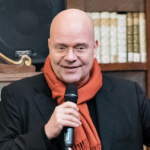

Michael Hagner, born in 1960, is professor of Science Studies at the Department of Humanities, Social and Political Sciences at ETH Zurich. His research focuses on history of brain’s research, the role of imagines in the scientific research and recently on the history of book in the science.
After studied Medicine and Philosophy at the Freie Universität Berlin, he worked there as a neurophysiologist. He has taught at the Institute for the History of Medicine and Science in Lübeck, and at the Institute for the History of Medicine in Göttingen.
Michael Hagner was visiting professor at the universities of Salzburg, Tel Aviv, Frankfurt am Main and Cologne. Moreover he was visiting scholar at the Wellcome Institute for the History of Medicine in London.
He was a fellow at the Collegium Helveticum, at the Zentrum für Literatur und Kulturforschung in Berlin and at the Maison des Sciences de L’Homme in Paris. Since 1997 he has been senior scientist at the Max Planck Institute.
He has received several honours for his research, and he awarded the Sigmund-Freud-Preis für wissenschaftliche Prosa by the Deutsche Akademie für Sprache und Dichtung, of which he is a member. He is part of the Leopoldina, and the Akademie der Wissenschaften zu Göttingen.
Among his publications: Homo cerebralis. Der Wandel vom Seelenorgan zum Gehirn (Berlin, 1997), Der Geist bei der Arbeit. Historische Untersuchungen zur Hirnforschung (Wallstein, 2006) and Der Hauslehrer. Die Geschichte eines Kriminalfalls. Erziehung, Sexualität und Medien um 1900 (Suhrkamp, 2010).
SELECTED BIBLIOGRAPHY
- Visualization in the Age of Computerization (Routledge, 2014)
By Aud Sissel Hoel, Steve Woolgar, Timothy Webmoor, and Annamaria Carusi - Carusi A & Hoel AS (2013) Towards a New Ontology of Scientific Vision In Coopman C, Vertesi J, Lynch M & Woolgar S (Ed.), New Representations in Scientific Practice Cambridge, Mass.: MIT Press.
- Carusi A (2012) Making the Visual Visible in Philosophy of Science. Spontaneous Generations : Journal for the History and Philosophy of Science, 6(1).
- Carusi A (2012) From data archives to ethical labyrinths In Dicks B (Ed.), Qualitative Digital Social Research Methods Sage Publications.
- Carusi A & Jirotka M (2010) Reshaping research collaboration: The case of virtual research environments, World Wide Research: Reshaping the Sciences and Humanities (pp. 277-294).

